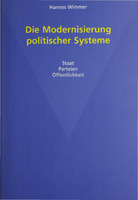Die Modernisierung politischer Systeme
Staat. Parteien. Öffentlichkeit
Author(s)
Wimmer, Hannes
Collection
Austrian Science Fund (FWF)Language
GermanAbstract
Part one of the book discusses political systems of Developing Countries. It suggests that the concept of neopatrimonialism is becoming more and more important. Neopatrimonial systems are characterized by three components: Personal rule, political clientelism and endemic corruption. The neopatrimonial state is essentially a weak state, where the production of public goods is very low and the road to the failure of the state open. For the transformation or improvement of a neopatrimonial system a developmental state is necessary.
Part two tries to give a theory of the state. The state is understood as a set of complex institutions. Historical institutionalism seems therefore to be the correct approach. Four institutional complexes are needed for consolidated modern statehood: The military for the security of the state – the military revolution can be regarded as the most important factor in explaining the origin of the state. Territorial segmentation is at the same time the building principle for the international political system. As the professionalism of the military increases, a new institutional complex becomes necessary for the security of the citizens: the police, and the police is the institution for the monopoly of legitimate violence.
The second institutional complex is taxation and the ordering of state finances (the budget). Taxes are historically a consequence of standing armies. Today taxation is an important dimension of state capabilities.
The third complex is the bureaucracy – necessary for the production of decisions based on general rules. An effective bureaucracy is a precondition for the development of the welfare state. Corruption its main problem.
The forth complex is placed at the top of the state – governing all the other institutions. It is essentially the government in combination with the parliament as a law-making institution.
Part three tries to explain the process of democratization. Democracy needs three subsystems: the public sphere as the interaction of mass media and discourses of the citizens. A party system, where the parties are based on political ideologies. And a parliament, as the center of a representative government. Responsiveness can be explained as a consequence of general free elections. Neben einem Überblick über die Modernisierungsprobleme von Entwicklungsländern untersucht der Autor den Konstitutionsprozeß des modernen Staates in Europa. Welche sind die zentralen "Institutionen des Staates"? In welcher Weise ist die Ausdifferenzierung der politischen Parteien an die ideologischen Strömungen der politischen Öffentlichkeit geknüpft, und sind es im wesentlichen die Prozesse der medialen Kommunikationsrevolutionen, welche die Sinnstiftungsmärkte der Gegenwart völlig verändern und damit u. a. die Parteien zu erheblichen Anpassungen zwingen? Die Zukunft der Demokratie, so der Schluß des Autors, hängt daher in hohem Maße von der Operationsweise der Subsysteme und ihren Interaktionseffekten ab
Keywords
Neopatrimonialism; theory of the state; origins and development of the modern state in European history; institutions of consolidated modern statehood; subsystems of democracy; Modernisierungsprobleme von Entwicklungsländern; Parteien; Politisches SystemDOI
10.26530/oapen_472490OCN
994447668Publication date and place
2000Grantor
Imprint
BöhlauClassification
History


 Download
Download